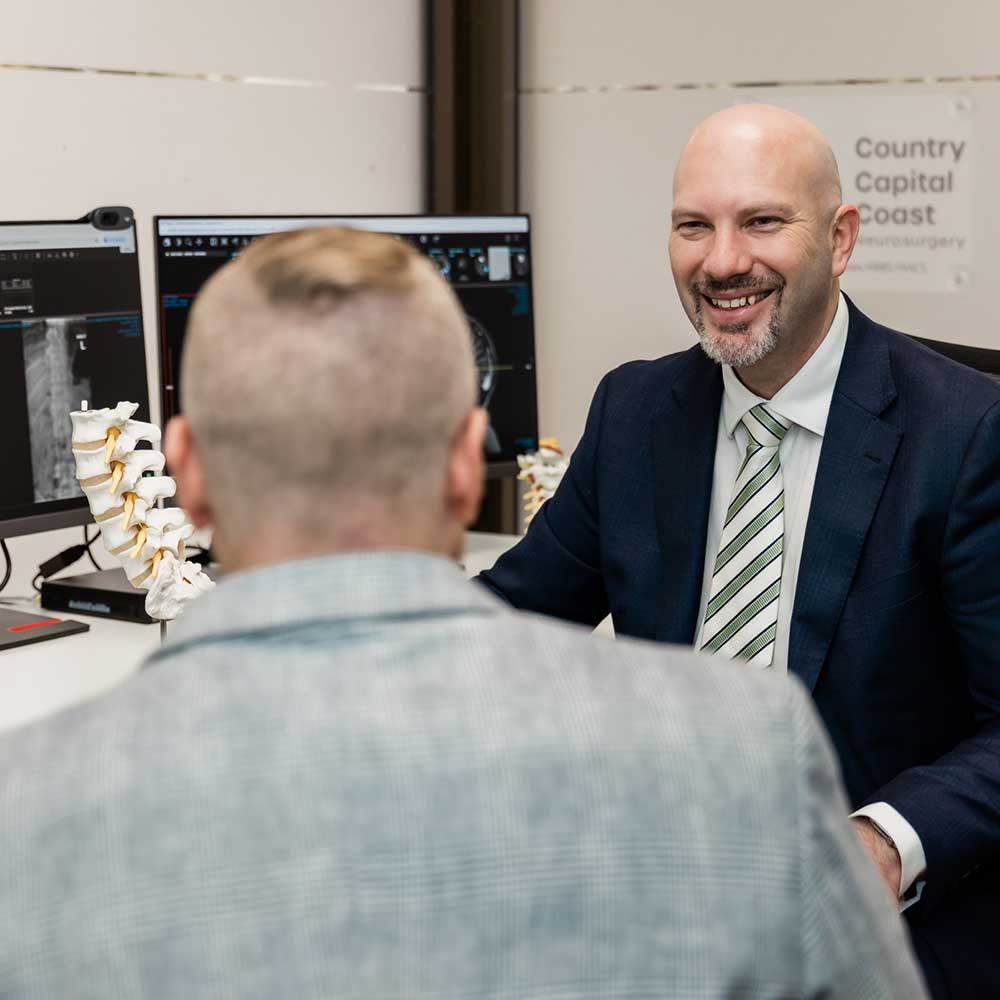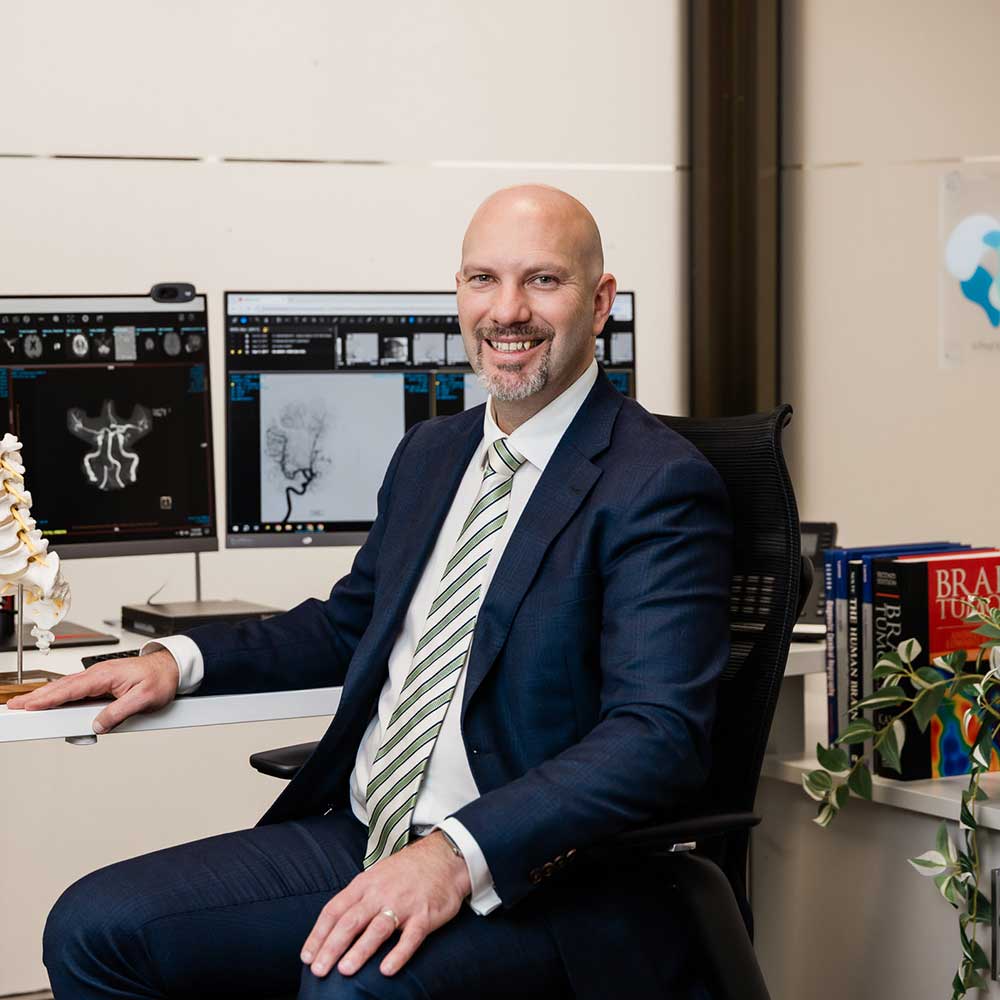Timely diagnosis, specialist evaluation and precise neurosurgical treatment are often critical in achieving the best possible outcomes.
A/Prof Peter Mews is an experienced neurosurgeon who provides comprehensive assessment and surgical management of a wide spectrum of brain conditions, ranging from tumours and vascular disorders to trauma, congenital abnormalities and functional brain surgery.
His dual training in both open and endovascular surgery makes him one of only a very small number of neurosurgeons in Australia able to offer advanced cerebrovascular care across the full range of techniques. A/Prof Mews is also trained in endoscopic brain surgery (neuroendoscopy), with a special interest in pituitary surgery using this technique.
Below is an overview of the major categories of brain conditions commonly treated by A/Prof Mews.
Brain tumours can arise from brain tissue itself, from the coverings of the brain, or from spread of cancer elsewhere in the body. Tumour behaviour varies greatly: some are benign and slow-growing, while others are highly aggressive.
Symptoms often depend on the tumour’s size and location, and may include headaches, seizures, visual or hearing changes, weakness, speech difficulties or changes in personality.
Treatment may involve surgery, radiotherapy, chemotherapy, or a combination. Surgery is frequently the first step to relieve symptoms, confirm the diagnosis and, where possible, achieve maximal tumour removal while preserving function.
Conditions treated include:
Cerebrovascular disorders affect the blood vessels of the brain and can cause stroke, bleeding, or progressive neurological decline. These conditions are often sudden in onset and can be life-threatening.
Symptoms may include sudden weakness, severe headache, visual loss, speech impairment, or collapse.
Treatment options depend on the condition and may include open surgery, minimally invasive endovascular procedures, or decompressive surgery to relieve pressure. A/Prof Mews’ dual training in both open and endovascular techniques allows him to tailor treatment to each patient’s specific needs.
Conditions treated include:
Trauma remains a leading cause of brain injury in Australia, particularly among younger adults. Motor vehicle accidents, falls and sporting injuries are common contributors. TBIs range from mild concussions to life-threatening haemorrhages requiring urgent neurosurgical intervention.
Symptoms may include loss of consciousness, confusion, persistent headache, vomiting, neurological weakness or seizures.
Treatment options vary widely, from close monitoring to urgent surgery to remove blood clots, repair skull fractures or relieve intracranial pressure.
Conditions treated include:
Hydrocephalus occurs when cerebrospinal fluid (CSF) builds up in the brain’s ventricles, leading to raised pressure. It may present at birth, develop later in childhood, or occur in adults. In older adults, normal pressure hydrocephalus can cause memory decline, difficulty walking and incontinence – symptoms often mistaken for dementia.
Treatment usually involves surgical diversion of CSF using shunt systems or minimally invasive endoscopic procedures.
Conditions treated include:
Some neurological disorders arise not from structural lesions but from abnormal brain activity. In carefully selected patients, neurosurgery can dramatically improve quality of life.
Australia has seen steady growth in referrals for advanced functional procedures, including deep brain stimulation, with excellent results in conditions such as Parkinson’s disease.
Treatment options may include resection of the epileptic focus, implantation of stimulators, or disconnection procedures to reduce seizure burden.
Conditions treated include:
Although less common, infections and inflammatory conditions can seriously impact brain function.
Symptoms may include fever, headache, seizures, weakness or confusion. In some cases, urgent surgical drainage or biopsy is needed, alongside medical treatment such as antibiotics or steroids.
Conditions managed include:
A range of other neurosurgical procedures are undertaken to address pain syndromes, nerve compression, and cranial reconstruction following trauma or previous surgery. These conditions, while varied, can be life-altering in their impact, and surgical treatment can provide significant relief.
Examples include:
Brain surgery requires not only technical skill but also careful judgment and a commitment to the best possible patient outcomes. A/Prof Peter Mews is one of the very few neurosurgeons in Australia with dual expertise in both open and endovascular cerebrovascular surgery, as well as endoscopic surgery, allowing him to provide highly individualised treatment for even the most complex conditions.
His additional focus on skull base surgery and deep brain stimulation reflects a career dedicated to both cutting-edge techniques and compassionate patient care.
By consulting across Canberra, Wagga Wagga and Moruya on the South Coast, he ensures that advanced neurosurgical expertise is available locally to patients across the region


